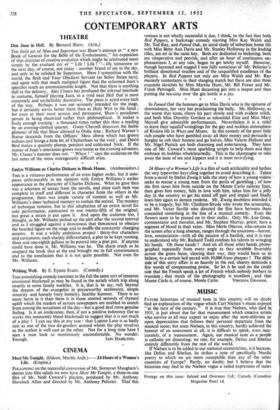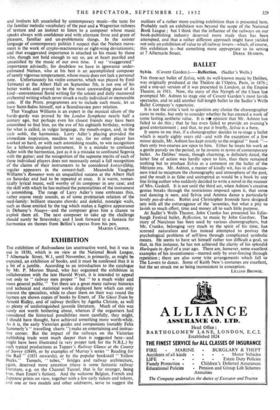MUSIC
FUTURE historians of musical taste in this country will no doubt find an explanation of the vogue which Carl Nielsen's music enjoyed "at the turn of the century." It is true that Nielsen, who died in 1931, is just about due for that reassessment which creative artists who survive at all may expect to enjoy after the semi-oblivion or open depreciation that follows their personal departure from the musical scene; hilt since Nielsen, in this country, hardly achieved the honour of an assessment at all, it is difficult to speak, even inac- curately, of a reassessment. Again, our musical taste as a people is catholic yet dissenting: we rate, for example, Delius and Sibelius entirely differently from the rest of the world.
If Nielsen is to be added to our national eccentricities, is it because, like Delius and Sibelius, he strikes a note of specifically Nordic poetry to which we are more susceptible than any of the other countries of Europe? Partly, no doubt; but I believe that the historian may find in the Nielsen vogue a veiled expression of tastes and instincts left unsatisfied by contemporary music—the taste for the familiar melodic vocabulary of the past and a Wagnerian richness of texture and an instinct to listen to a composer whose music speaks always with confidence and with alternate force and grace of pleasant, familiar and un-problematic things. In the sinister language of contemporary politics I suspect that the Nielsen move- ment is the work of crypto-reactionaries or right-wing deviationists; and that exaggerated importance is attached to his music by those who, though not bold enough to say so, are at heart puzzled and unsatisfied by the music of our own time. I say "exaggerated" importance advisedly, for doubtless we have in ignorance under- estimated Nielsen, who at his best is an accomplished composer of sanely vigorous temperament, whose music does not lack a personal note. Unfortunately his violin concerto, which was played by Emil Telmanyi at the Albert Hall on September 5th, is not one of his better works and proved to be the most unrewarding piece of its kind—conventional florid writing for the soloist and dully mannered orchestral writing which never struck a really individual or memorable note. If the Prom. programmes are to include such music, let us have Saint-Satins himself, not a Scandinavian poor relation.
That Vaughan Williams is an expert in the musical idiom of the hurdy-gurdy was proved by the London Symphony nearly half a century ago, but perhaps even his closest friends may have been astonished to find him, on the eve of his eightieth birthday, writing for what is called, in vulgar language, the mouth-organ, and, in the style noble, the harmonica. Larry Adler's playing provided the immediate inspiration, needless to say, for no other player has worked so hard, or with such astonishing results, to win recognition for a hitherto despised instrument. It is a mistake to confound Adler with the harmonica, just as it is a mistake to confound Segovia with the guitar; and the recognition of the supreme merits of each of these individual players does not necessarily entail a full recognition of the claims of their instruments to be considered konzertjahig, regular appearers in the concert-hall. Meanwhile Vaughan Williams's Romance won an unqualified success at the Albert Hall on Saturday and had to be repeated at once. It is warm, roman- tically lyrical music, well worthy of its composer in any case; and the skill with which he has realised the potentialities of the instrument is astonishing. The range of Larry Adler's tone embraces thin, rather coarse reedy sounds, as of some proletariah relation of the reed-family: brilliant staccato chords: and doleful, nostalgic wails, such as those emitted by the tug which makes a fugitive appearance in Debussy's Nuages—and the composer gives him a chance to exploit them all. The next composer to take up the challenge should surely be Stravinsky; and I look forward to a fantasia for harmonica on themes from Bellini's operas from his pen.
MARTIN COOPER.



































 Previous page
Previous page